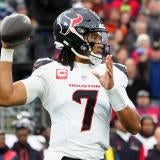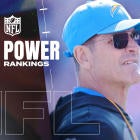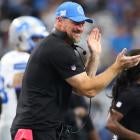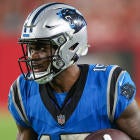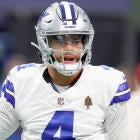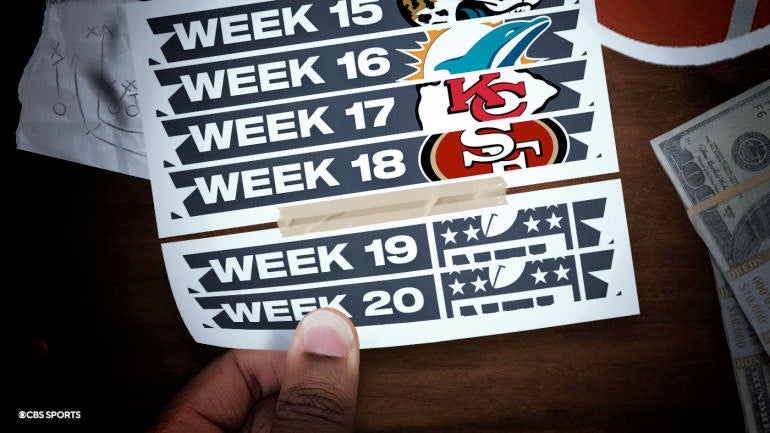
An 18-game NFL season is coming, and no one can do anything to stop it. Well ... that's not true.
But oddly, it seems to have already been embraced as inevitable by all parties just three years since the league went to 17 games, its first expansion of the regular season in 43 years.
It's less a march to 18 games and more of a jog. NFL commissioner Roger Goodell hasn't been shy about it. NFL team owners are seemingly already counting their chickens. Players appear to have accepted this will certainly happen during their careers even though they could simply not engage with the league for the next seven years and everything would stay the same.
There is nothing in the NFL's collective bargaining agreement that guarantees an 18-game season. Signed in 2020, the CBA is good through the 2030 NFL season. And adding something as massive as an 18th game would require an additional agreement between the league and the NFL Players Association.
Many around the league have anticipated this ultimately gets done via an amendment to the CBA. The NFL gets its 18th game with an obvious reduction to two preseason games, and the players get something, or some things, in return.
But multiple sources I've spoken to in recent months have floated another possibility. What if the union and league simply rip up the current CBA and redo it? What if, in a relatively peaceful time between labor and management, the two sides reach a new agreement well ahead of the March 2031 deadline and set sail on a new deal that includes the 18 games and a host of new benefits for players?
No one must wait several years just to posture near the deadline. No threat of a lockout. No one's out any money. The inevitability of 18 games becomes reality, and everyone winds up making more money anyway.
Sources say the league and union have not engaged in any talks around an 18th game, or even about an entirely new CBA. But through conversations with more than a dozen sources since the Super Bowl, here's the case for when, why and how a new deal could take place sooner than later.
Why new CBA deal could occur before March 2031 deadline
The concept of adding an extra regular-season game and reducing the preseason is known in league circles as the 18+2 model. Goodell first floated 18+2 during Super Bowl week and again last week at the league meetings in Nashville.
"We would do it in the context of reducing the number of preseason games," Goodell said. "We think that's a good trade: Less preseason games and more regular-season games."
But Goodell has always noted there's no timeline for the change. If he and team owners have a year in mind, no one is saying so.
"It's something we think about in the long-range context," Goodell said last week. "It's moving to quality and making sure we do everything possible to bring our fans what they want. They want, obviously, more football. I'm not sure they want more preseason."
The calendar lends itself well to 18+2. The NFL would begin the regular season on Labor Day -- one week earlier than it does now -- and introduce a second bye week to all teams. That would mean the Super Bowl would fall on the third Sunday of February, coinciding with President's Day and making Super Bowl Sunday an unofficial federal holiday.
The reason the league wants an extra game is obvious. An additional 16 regular-season games would mean tens of millions of dollars more per team in revenue, and perhaps more than $1 billion annually for the league and players.
This league is well known in the sports industry for its trial balloons, and Goodell launching the idea on Super Bowl week on ESPN's popular ''Pat McAfee Show'' was in no way a mistake. The NFL wants everyone to get comfortable with the idea before it ever happens, with no one realizing the comfortability is the reason why it happened.
No one does Inception quite like the NFL.
At 65 years young, Goodell will preside over the league for at least another three seasons after team owners extended his contract in October to run through the spring of 2027. Goodell has never publicly stated a retirement date, and sources I spoke with in October believed he would look to get another extension in a few years. Importantly, there is no clear and obvious successor to Goodell.
Goodell is an NFL lifer who, as commissioner, has overseen two CBA negotiations. His current deal would stop him several years short of a third CBA, as well as another broadcast rights deal when the current one runs through the 2033 season (and more on that later.)
Should neither side engage in CBA discussions until the current deal is up following the 2030 season, Goodell will need at least one more contract extension (his fifth) to ensure he could get his third CBA in his early 70s.
On the other side of the negotiating table will be first-timer Lloyd Howell Jr., who last June was tabbed to be the next executive director of the NFLPA. In what was an unusually secretive election process, the union picked Howell to succeed DeMaurice Smith last year.
Howell, 58, had most recently retired as the chief financial officer at Booz Allen Hamilton before joining the union. He holds a bachelor's degree in electrical engineering from the University of Pennsylvania and got his master's at Harvard Business School.
When Smith's tenure was ending, many believed the union would opt for a former player to lead it. Gene Upshaw, a Pro Football Hall of Famer before ascending to the top of the union, had preceded Smith, who was a D.C. attorney and outsider to the NFL world.
Though Smith oversaw two CBA negotiations, he narrowly got the players to approve the 2020 CBA, and his relationship with the players had chilled toward the end of his tenure. Despite a historically high salary cap, it's arguable the financial aspects of the deal have worsened for the players in the four-plus years since its ratification.
Howell's financial background is a key indicator of what the next generation of union leadership values.
Howell has done very little media since taking over. Sources have said he wanted to spend the first year or so meeting with players and getting a lay of the land.
Because he's still spending time gaining capital with players, one league source noted he doesn't have the juice to go to them and present 18 games as a legitimate opportunity today even if he wanted to. Going to the players now would be an error so uncommonly early in one's leadership tenure that only Liz Truss could rival it.
Howell isn't offering his thoughts publicly on what the next CBA should include, but he surely has plenty of them. If the men he leads feel they are stuck in a bad deal, it would be his charge to fix it. And a source indicated he would need a contract extension to see the 2030 season, too.
If it's a fait accompli there will be an 18th game by the start of the 2031 season, and if owners are thirsty for increased revenue it will bring, then the union may currently own the most leverage it can get. The sooner owners agree to what the players want, the sooner they can unlock hundreds of millions of dollars more.
Or, the union could argue, we'll just wait until 2031.
What NFLPA should seek in exchange for extended season
Before addressing what the union should argue for in its next deal, let's first address what should not be considered a concession by owners or a benefit to the players.
One fewer preseason game: The NFL and Goodell have relinquished any bargaining power with this one. "I'm not a fan of the preseason," Goodell said in February. "I don't think we need preseason anymore.'' The players aren't going to argue with that.
An extra bye: The health and safety of the players is paramount to the league. Last week, Goodell said "the key thing ... is making sure we continue to do the things that make our game safer." To add an extra game necessitates an extra bye.
An extra game check: Players are working an extra day to get an extra day's check. You don't go into the office on a Saturday to work for free. If making an 18th check is perceived as a benefit, just imagine all the money you'll make if you play 52 weeks a year!
Those last two are top-line items the players will likely ask for off the bat. As surely as owners want an extra game, the players want these two things.
1. Increased split of revenue: The players negotiated a revenue share that now reaches 48.8% in the current CBA. How the league divvies up its revenue is rather complicated, but the national broadcast deals make up a large portion of all revenue. Several other revenue streams like ticket sales and gambling sponsorships contribute to the big bucket of nearly $20 billion in total annual revenue for the league.
If everyone agrees with how certain money goes into the big bucket and certain money doesn't -- and everyone won't agree, but let's not argue now -- then the players nabbing an extra percentage point would be a clean way to negotiate a big benefit.
2. Offseason and training camp overhauls: Could we be close to the end of organized team activities? The already voluntary workouts have become deemphasized across the league in recent years. Teams have started cutting short the three-day mandatory minicamps in June by going on team-bonding field trips. The league has been trending this way recently, and the success of the 2020 season with no organized work ahead of training camp is the strongest argument for players that it can be done.
"Asking coaches whether you should take away practice is like asking the Cookie Monster if there should be less cookies," former NFLPA president JC Tretter told me in 2021. "The answer is always going to be no, they want more. That is just kind of how it is, so that's not surprising."
Doing away with the April, May and June workouts for non-rookies could be a next step for the union, sources have told me. Training camps would then report in late June or early July -- especially with Week 1 being bumped up a week -- with a longer ramp-up period.
In recent years there's been a proliferation of joint practices. For most NFL teams, those joint practices have taken the place of the actual preseason games. Those would likely continue or grow in the two months between the start of this new preseason work and Week 1.
Those two concessions are obvious, but the union can, should and will ask for more in the event of an entirely new CBA. Here are some of the high-level items the players should try to get in any future negotiation.
Franchise and transition tags: True, pure, unadulterated free agency will never exist in the NFL so long as the franchise tag exists. Shedding the tag will raise the ceiling and the floor on what players can earn in free agency.
The tag gives teams control over players during what is typically their biggest earning window. Getting to free agency is already hard. The standard rookie contract is four years, which is less than the average career of an NFL player. For first-round picks, there's the fifth-year option, followed by team options to tag a player twice before he ever hits free agency.
The non-exclusive franchise tag value equals the average of the top five salaries at a player's position over the past five years. It is hardly a bad paycheck, but it's a check that has no security beyond that season.
Sometimes it's used as a placeholder to work out a deal over the next several months. But players still have no recourse, which is what Bengals wide receiver Tee Higgins is finding out as the final tagged player without a contract extension.
The tag is also used as a metric by which to evaluate long-term deals as well. Big-time extensions should have guaranteed money over the first two years that are equal or greater than the price of two tags. To do away with the tag could potentially do away with that measurement, which would shake up how contracts are both done and evaluated.
The union has tried and failed to shed the tag in several bargaining negotiations. To rid the league of the tag would be a giant leap toward true NFL free agency and higher salaries for all players.
Non-NFL stadium revenue: Players don't see a dollar from naming-rights sponsorships on stadiums, but their work is -- in almost every case -- the primary reason any sponsor wants its name on the stadium.
Players also see none of the money generated from non-NFL events at these stadiums. When a big music act comes to town, or the professional soccer team takes the pitch, or a college football game is played on the field earlier in the week, NFL players get nothing from that.
Angling for some portion of those revenues that are currently unavailable to players to be included in the salary cap estimation could be a play for the union. And here's why:
The most public battle the NFLPA has waged with the league in recent years is the grass vs. turf debate. The union wants grass fields in all 30 stadiums, yet increasingly more stadiums are going with a synthetic surface. The union has been successful in eradicating the dangerous slit-film turf in quick order (there were seven teams who had it two years ago, and there will be zero to start this upcoming season), but getting all 30 to natural grass is, frankly, an unreasonable expectation.
Part of the reason team owners had synthetic surfaces is because it allows them to host more events at the stadium. More events equal more money. And that's more money that the players -- most of whom want grass fields and won't get them -- currently don't see.
The union could drop its "all grass or else" stance and instead adopt a "pay us for turf" stance. If the players can't get their preferred playing surface, at least they can get paid for their troubles.
Fully guaranteed contracts? There is likely no universe where NFL team owners will agree to fully guaranteed contracts. If this is going to be a hang-up for the union, there's not much sense entering into any talks.
But here's something the union absolutely knows: They don't have to collectively bargain fully guaranteed contracts to get them. Major League Baseball didn't. The NBA didn't. As Tretter wrote in 2022 about those leagues, "guaranteed contracts came about from the precedent set by one player and agent, with those coming after them demanding the same."
The NFLPA was hopeful Deshaun Watson's fully guaranteed contract would be the precedent setter, like Larry Bird and Catfish Hunter in the other leagues. But then Russell Wilson and Kyler Murray agreed to non-fully guaranteed deals, and any potential momentum to establish fully guaranteed deals as standard was dashed.
Doing away with the archaic funding rule could help this endeavor. Teams have to place future guaranteed dollars into an escrow account, and that's become a reason some teams don't pay out more in guaranteed money. Doing away with that rule when the league is financially healthier than ever before makes sense.
The players won't get fully guaranteed deals in the next CBA, but their collective power can still bring them to fruition in the future.
Increased broadcast revenue split: The annual salary cap calculation can sometimes be complex, but the biggest part of it, again, comes from the broadcast rights deals. As part of the calculation, players currently see 55% of the projected league media revenue. That's a majority percentage on the biggest single pot of money there is.
But the union could push for more, and there's an argument that it should. Since inking the 2020 CBA, the league has added Amazon ("Thursday Night Football"), Google (Sunday Ticket) and Netflix (Christmas Day games) as partners. The CBA accounts for new media partners, so players are seeing their share of all those deals already.
The league has never had so many broadcast mouths to feed, and the players are going to be feeling that this season. Not so long ago, the NFL avoided giving teams multiple weeks of short rest (Sunday to Thursday, for example.) Last year, eight teams had more than one short-rest week. This year, 14 teams will have multiple such weeks.
It's that Inception I wrote about earlier. It has become the norm in the league that now has so many standalone windows with so many broadcast partners that the players are feeling the strain. And there's no recourse players have in the CBA to stop this sort of scheduling from continuing.
So if the league is going to have the Chiefs play on six days of a week, or surprise everyone with Wednesday Christmas games a year after saying they wouldn't, then perhaps players can get a bigger piece of the broadcast pie.
Other parts of the CBA the union may wish to examine are:
- Competition Committee: There was an uproar from players (mostly defensive) who did not want to see the hip-drop tackle prohibited. The union voiced its displeasure with the league moving forward with outlawing it, but it didn't matter. The union has very little say over changes to the actual game, in part because it only has one seat on the competition committee. Understanding the hip-drop tackle was going to be eliminated no matter if the union had one, two or three seats on the committee, the players could still push to have more of a voice when it comes to what is and isn't in the game moving forward.
- Punishments: The NFL got a little fine-happy this past season before settling down later in the season. Monetary fines are a way for the league to eliminate certain plays out of the game without seeing too many flags on the field. But players will want to stop handing over money for things like incidental contact with a helmet. The players may also want to take another look at how much authority Goodell has in larger punishment matters. For years that was a sticking point with the union, and in 2020 it was able to secure a third-party independent arbitrator to handle player disputes between the league and union. In the 2022 case of Deshaun Watson, arbitrator Sue L. Robinson issued a six-game suspension for Watson related to multiple allegations of sexual misconduct. Two days later, Goodell appointed a delegate from the league to oversee the NFL's appeal of the ruling. Goodell himself could have even presided over the appeal. Watson eventually settled with the league on an 11-game suspension, a $5 million fine and mandatory treatment. Irrespective of the details surrounding Watson, the union could attempt to wrest some power in the appeals process away from the league.
- Current and former player benefits: Whether it's a better retirement package or improved health care, players can look at how they are setting themselves up for life after football in this deal.
NFL could finally include 18th game in a new CBA deal
The 18th game is going to bring even more money for team owners who have in their possession the golden ticket that is an NFL franchise.
More games mean more inventory. That means sweeter sponsorships deals. It could mean more public funds from local governments that will see those tax dollars going to even more use at those stadiums. And it leads to a path where there are international games for all NFL teams each year rather than the cap of 10 games through the 2025 season.
But one of the strongest reasons for NFL team owners hoping to get an 18th game locked in sooner than later relates to the broadcast rights deal the league signed with partners just a few years ago.
That deal goes through the 2033 season with partners such as CBS, NBC, Fox and ABC/ESPN. As robust and healthy a deal as it is, the NFL can opt out of the deal in 2029, and sources have believed the league very well could exercise that right.
You'll recall the broadcast deal is the largest bucket of money coming into the league, so that deal matters more than any other. If the league opts out of the deal in 2029 and there's a labor stoppage looming less than two years later, the NFL wouldn't be negotiating from its strongest possible position.
Make no mistake -- the NFL will be in the catbird seat in just about any negotiation. But what if, in the years leading up to 2029, the league has already locked into the 18th game? What if the league has secured another decade of labor peace by the time it looks to cash in with a new broadcast deal? Consider how strong the league would be then.
There would be no guessing about what the expanded season would look like, nor any worry the players wouldn't show up to work in a couple of years.
With the everchanging media landscape, the NFL would have had years to evaluate how to best monetize the new way we digest the product while striking at a healthy time for the future of the league.
A new deal could be Goodell's swan song on what would, at that point, be an undeniably successful tenure as commissioner. A fresh CBA could establish Howell as the worthy leader of a players union getting its fair financial share.
Eighteen games has been in the long-term vision of the league for the last two CBAs, and it serves as a natural endpoint for game expansion. Soon, the wait could be over.






